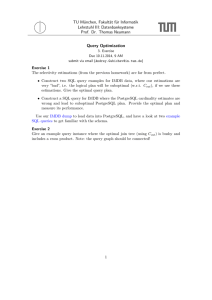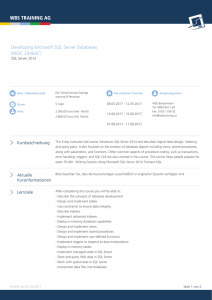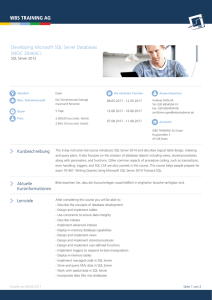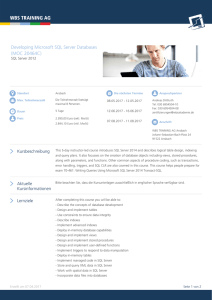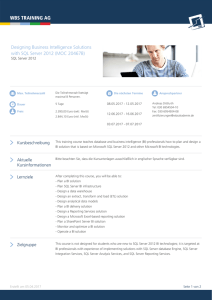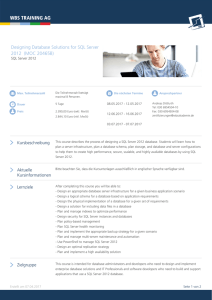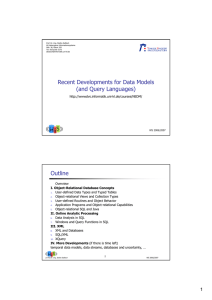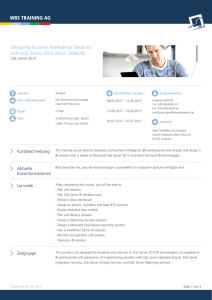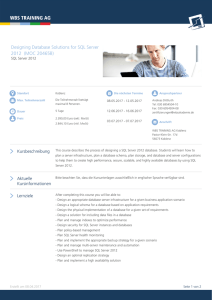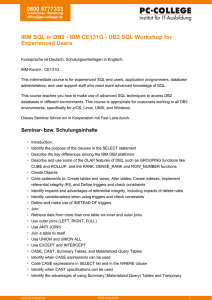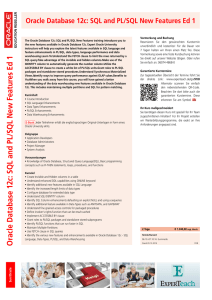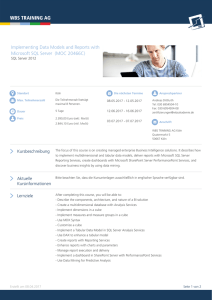Slides
Werbung
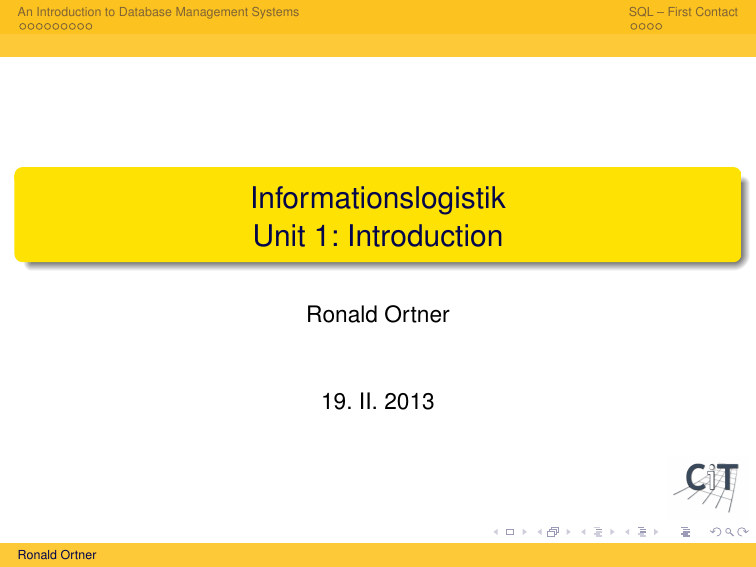
An Introduction to Database Management Systems SQL – First Contact Informationslogistik Unit 1: Introduction Ronald Ortner 19. II. 2013 Ronald Ortner An Introduction to Database Management Systems Outline 1 An Introduction to Database Management Systems Overview 2 SQL – First Contact A Query Language Ronald Ortner SQL – First Contact An Introduction to Database Management Systems Overview Outline 1 An Introduction to Database Management Systems Overview 2 SQL – First Contact A Query Language Ronald Ortner SQL – First Contact An Introduction to Database Management Systems SQL – First Contact Overview Eine Frage zum Einstieg Eine Frage Wie stellen Sie sich Ihren Arbeitsalltag als LogistikerIn vor? (das ist übrigens so ziemlich die letzte Folie auf Deutsch) Ronald Ortner An Introduction to Database Management Systems SQL – First Contact Overview Eine Frage zum Einstieg Eine Frage Wie stellen Sie sich Ihren Arbeitsalltag als LogistikerIn vor? Data are important! (das ist übrigens so ziemlich die letzte Folie auf Deutsch) Ronald Ortner An Introduction to Database Management Systems SQL – First Contact Overview Why Database Management Systems? Isn’t MS Excel all I need? Issues: Redundancy and inconsistency How to join data in distinct files? What if there are several users of a file? (e.g.: privileges to edit?) Data loss Violation of data integrity Security (another facette of the multi-user problem) Reinventing the wheel several times Ronald Ortner An Introduction to Database Management Systems Overview This Lecture At the end of the term you shall be able to query information from databases, design databases for any purpose. Each lecture consists of a theoretical part (mainly concerning database design), a practical part (mainly dealing with the data query language SQL). Ronald Ortner SQL – First Contact An Introduction to Database Management Systems SQL – First Contact Overview Data Abstraction There are three levels of data abstraction: Physical level (how the data is stored, e.g. on a hard disk) Logical level (how is the data structured) User view (what an individual user can see) Ronald Ortner An Introduction to Database Management Systems Overview Data Models Database management systems are based on data models. A data model determines how data objects can principally defined, how data can be accessed and manipulated. Ronald Ortner SQL – First Contact An Introduction to Database Management Systems Overview Data Models Database management systems are based on data models. A data model determines how data objects can principally defined, how data can be accessed and manipulated. Accordingly, a data model consists of a data definition language (DDL) a data manipulation language (DML) Ronald Ortner SQL – First Contact An Introduction to Database Management Systems SQL – First Contact Overview DDL and DML The data definition language (DDL) provides e.g. data types to store information (e.g. numbers, strings, etc.). The data manipulation language (DML) consists of a query language (to ’read’ the data) a ’genuine’ data manipulation language (to modify the data) Ronald Ortner An Introduction to Database Management Systems SQL – First Contact Overview Intensional and Extensional Level Any database consists of an intensional level (the structure how the data is stored) an extensional level (the data itself) While the intensional level usually remains unmodified in a database’s lifetime, the extensional level will change regularly. Note that changing the intensional level may cause a lot of trouble. Ronald Ortner An Introduction to Database Management Systems Overview Several Types of Data Models There are several types of data models: network model hierarchical model object oriented model relational model deductive model XML Ronald Ortner SQL – First Contact An Introduction to Database Management Systems Overview Several Types of Data Models There are several types of data models: network model (outdated) hierarchical model (outdated) object oriented model relational model deductive model XML Ronald Ortner SQL – First Contact An Introduction to Database Management Systems Overview Several Types of Data Models There are several types of data models: network model (outdated) hierarchical model (outdated) object oriented model (short intro) relational model deductive model XML Ronald Ortner SQL – First Contact An Introduction to Database Management Systems Overview Several Types of Data Models There are several types of data models: network model (outdated) hierarchical model (outdated) object oriented model (short intro) relational model (focus) deductive model XML Ronald Ortner SQL – First Contact An Introduction to Database Management Systems SQL – First Contact Overview Several Types of Data Models There are several types of data models: network model (outdated) hierarchical model (outdated) object oriented model (short intro) relational model (focus) deductive model (visit my logic lecture) XML (M. Antenreiters lecture ’Datenbeschreibungssprachen’) Ronald Ortner An Introduction to Database Management Systems A Query Language Outline 1 An Introduction to Database Management Systems Overview 2 SQL – First Contact A Query Language Ronald Ortner SQL – First Contact An Introduction to Database Management Systems SQL – First Contact A Query Language Verwendete Software MySQL Community Edition (Version 5.0.77-4) SQLYog Community Edition (Version 8.8.2) Datenbanken zum Download auf Lehrveranstaltungsseite Ronald Ortner An Introduction to Database Management Systems SQL – First Contact A Query Language Zur Installation zuerst MySQL installieren (Passwort vergeben und merken) dann SQLYog installieren (neue Connection, dann gemerktes Passwort eingeben) zum Importieren der Datenbanken siehe Liesmich-File Ronald Ortner An Introduction to Database Management Systems A Query Language SQL – First Contact Demonstration of SQL live in the lecture sorry, no slides for this, but... ... there are handouts with all the important information. Try it yourself at home and in the exercises! additional help with SQL: - Website: http://sqlzoo.net - Lecture notes VO: Oracle I Ronald Ortner SQL – First Contact
